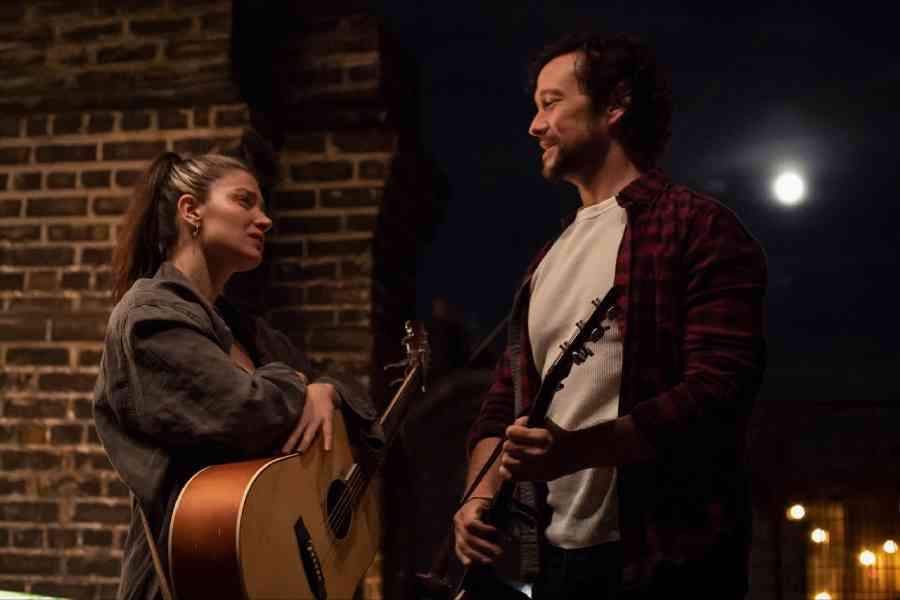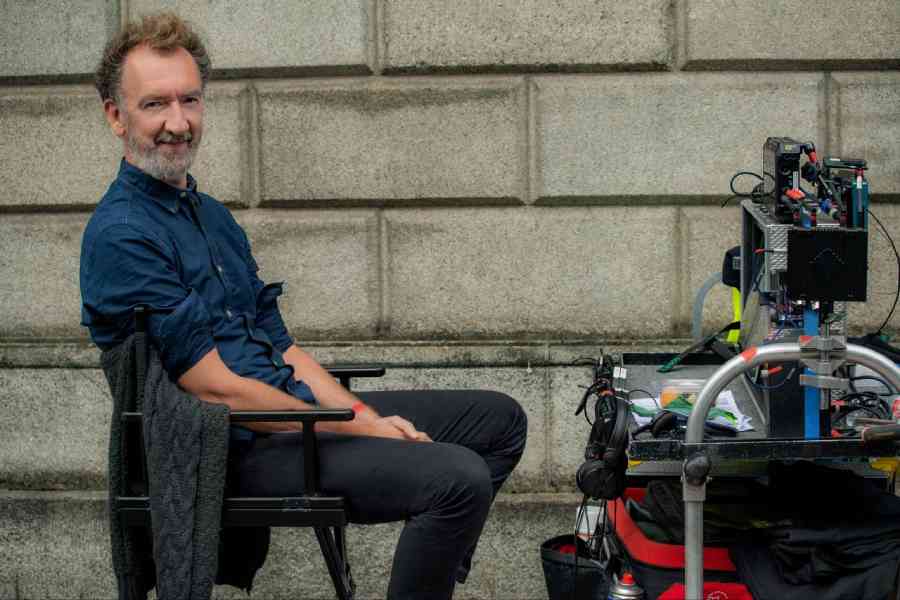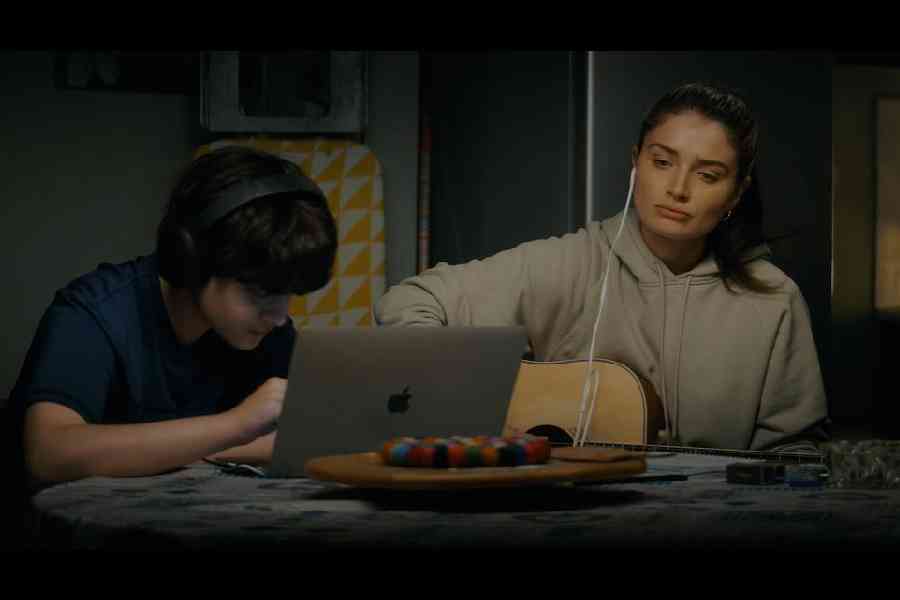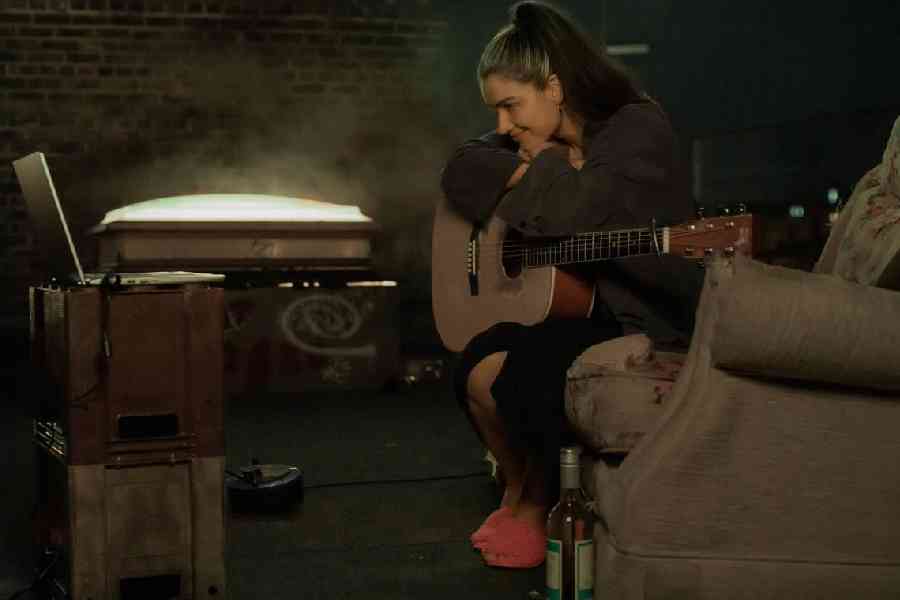Once in a while comes a filmmaker who is an expert at making cinematic moments with music. You hear a song and immediately you are reminded of those moments. John Carney is one of them. His are films you can curl up on a sofa with after you have seen everything that is to be seen on a streaming service. After delivering gems such as Once, Begin Again and Sing Street, the man is weaving his magic again with the musical-comedy Flora and Son, which is coming to Apple TV+ on September 29.
Flora and Son unspools only to wrap the viewer in a cinematic blanket of warmth with a relatable storyline that’s punctuated by flippant humour and oodles of earnestness. Carney chose the delightful Eve Hewson, who can be sparky, snarky and exceptionally versatile, something we have already experienced watching the Apple TV+ series Bad Sisters or films like Tesla, Bridge of Spies and Enough Said. By the way, Eve is the daughter of singer Bono and activist Ali Hewson but they, of course, don’t define her career path.
‘People were dislocated and distant’
Carney has a new story to tell, of a single mother (Hewson plays Flora) trying to cope with her rebellious teenage son Max (Oren Kinlan) without giving in to every unreasonable demand. The two men in her life are the son’s father (Jack Reynor), from whom she has separated, and Jeff, her guitar teacher (played by Joseph Gordon-Levitt), who has had enough of selling music. It’s complicated and simple at the same time, like it is with every Carney film. There is that much-needed whiff of hygge or cosiness required to make the viewer return for one more play.
“I sit down with a blank screen and start to write with images that interest me. And characters come to my mind and come onto the page. Sometimes they get deleted and sometimes they stick. Once I had the sort of three or four central characters in place, I started to think about the themes that I wanted to explore,” Carney tells t2oS over a video call from his home in Dublin.

Eve Hewson and Joseph Gordon-Levitt in Flora and Son
I mention the Danish concept of hygge for a reason. The pandemic, in a way, made discontent reach a new peak. People struggled and continue to do so. Love your neighbour? Well, you can at least tolerate him. A bit of hygge can be good for everyone. In fact, there can never be enough hygge like there can’t be enough cat videos.
When the film begins, Flora and her son Max have learned to tolerate each other but there comes a point when everything becomes a sticky mess. Max can be a good musician but Flora needs to understand that music can be more than just playing the guitar, which she gifts her son. Max’s feet move to electronica. And this is when Flora decides to explore a happy space inside her by learning to play the guitar instead of giving it a resting place in a dumpster where it was originally found. Well, if not anything it would be enough to piss off her former partner, who is a talented musician. And who can teach Flora to play the guitar than an online teacher in Los Angeles, one whose musical aspirations are fading?
“The pandemic was a very alienating time. People were dislocated and distant. People were fearful of each other a little bit and all these things. I was thinking a lot about that and I was thinking a lot about it in terms of how that would affect my own relationships. My relationship with my mother was complex in some ways and wonderful in other ways. It was in the ’70s and ’80s. How would the same relationship be affected by the Internet now, and by the dislocation and the disassociation of the Internet, and the constant distraction of phones and all of that,” says the director.
Music and lyrics
Relationships are meant to stumble in a Carney film but he always manages to blend jarring set pieces into the plot with a certain degree of deftness. Take the example of his classic musical, Once, which tells the story of a busker (played by Glen Hansard) who meets a young East European pianist (Marketa Irglova) on the streets of Dublin. They become friends, collaborators and potential lovers but they are also in the midst of a troubled relationship.
In Flora and Son, Max begins moving in a circle of wrong friends, Flora’s life is at its nadir as she tries to eke a living through babysitting for a privileged family and her teacher Jeff believes he has written a good song, titled Meet in the Middle.

Director John Carney behind-the-scenes of Flora and Son Picture: Apple
“I feel like it would be more of a challenge now to have problems in a family. At least, then, kids got a break from bullying. They got to go back to their families, even if it was dysfunctional. There was physicality and you you saw people. I wondered what it was like now to take a messy situation and to set it right now. I started to sort of scratch it back a little bit and imagine a world that was dysfunctional and a bit broken, and how that might be repaired,” says Carney.
He manages to get the mix of songs right enough to spark off a poignant conversation about the vulnerability of artistes and the boredom and rush of everyday life.
Flora has her favourites, like You’re Beautiful. And she cries to a video of Joni Mitchell’s Both Sides Now. But the high points are two original songs in the film, Meet in the Middle, which Jeff has been trying to perfect for a long time, and High Life, the track that rounds off the film.
Joseph Gordon-Levitt gets the feel of Meet in the Middle just right: Get in my car/ I’ll drive you through the canyon/ Breathe in Topanga for the day/ And when we reach the ocean/ And we can’t go further west/ We’ll keep on driving anyway.
But it’s High Life that shines with its spontaneity. The closing number is performed in the movie by Eve Hewson, Oren Kinlan, Jack Reynor and Joseph Gordon-Levitt. Variety reports that the track will be submitted for Academy consideration.
A special mention needs to be made of Both Sides Now, which is often used in films, like Love Actually. Joni Mitchell wrote the song when her first marriage was falling apart while her songwriting career was blossoming. She described it as “a meditation on reality and fantasy”.
“There’s a purity about her work and her way of seeing things. All her ideas appear to have occurred to all of us. It’s not like her ideas are quirky or different; they’re familiar ideas, but they’re just expressed in ways that never occurred to us. It’s just the way she expresses it… that’s so universal. You kind of don’t even need to know what she’s thinking about. It’s a little bit like Tom Waits in that way, when you’re thinking about certain things, obviously,” says Carney.
Her performance of the song on Mama Cass Show in 1969 remains unforgettable. Wearing a simple dress, she dives into the heartbreaking song with a smile.
“I think the fact that she is just such a strong figure of a woman with that guitar and that video, and she’s so easy with it, and it fits her so well. It’s so different from the X Factor fame-grabbing diet that young people are growing up on these days. It almost looks new; it’s refreshing to see somebody just singing with a guitar, wearing a simple dress. There is no show and no dancing, not that there’s anything wrong with dancing and putting on a show, but there is just so much of it now. It was sort of refreshing, seeing that stillness. Just sing that melody and be done. I think that was an important thing and the floor got to learn a lot from that clip,” says Carney.
He got a set of actors who can more than carry a tune. Hewson grew up among all the U2 glory and madness. Joseph Gordon-Levitt can sound dreamy (listen to his rendition of Hey Jude). And Oren Kinlan has a good sense of rhythm. “I needed characters, people who could kind of sing a little bit, but not so good. So that became a very important part of the casting process where I’d say if you can hold a tune, that’s good, but you don’t need to be Beyonce or Taylor Swift or whatever,” says Carney.
Kinlan is a great find and what makes him special in the film is that he doesn’t overact, a quality that even Carney speaks of: “I had looked at a lot of young boys, and they haven’t been right for the part. They were actors, and they were overacting. Oren just had a great sort of stillness and calmness about him. He kind of walked on set and said his line… then walked off. He didn’t move his hands around. The second I saw his tape, I knew he was the kid. And he has a great look.”
A sacrosanct relationship
There is a simple reason why Carney understands music better than most filmmakers: He was once the bassist for one of Dublin’s best bands — The Frames. And this explains why he featured Glen Hansard in the film Once. Like U2, The Frames have aged well enough to make fans return to their music just to get over a dull comedown week. Songs like Seven Day Mile, Song for Someone and Dream Awake have grit and an aftertaste one can’t get enough of.
Carney had it all but shifting gears and moving into filmmaking was something he did without regrets.
“I still play music. But I played kind of semi-professionally when I was in my early 20s for like three years. I was in a band and touring and doing that sort of stuff. I didn’t like it. It kind of threatened to kill music for me a little bit… to monetise it in that way or to make it into a transaction. I was worried about the relationship that I originally had with music. And I’m not saying that it’s not right that you should get paid for your music; I’m saying that I personally didn’t want to equate the two because maybe I wasn’t good enough to get paid for it. But if I didn’t get paid for it, that would mean I wasn’t good. So I stopped doing it.”

Orén Kinlan and Eve Hewson
In a way, Carney channels this thought through the character of Jeff. He teaches music over Zoom, is content to have made some money through music and just wants to have a meaningful relationship with music, chilling in his Los Angeles pad.
“The purpose of music for me is not to be very good at it necessarily. Because there are enough great players out there. YouTube is full of excellent cream-of-the-crop musicianship. Sometimes that’s not enough. Sometimes music is therapy for you, behind just the playing and the learning of a piece or the playing at home is a very important part of my life, and I didn’t want to ever lose that. So I never tried to make money from music. I really adore it. Music would be a sacrosanct sort of thing for me. I am lucky enough to make money from filmmaking, which makes it seem like it’s a lesser art or something. I found the transition fine and I make these films now with lots of music, and that’s sort of comforting,” says the man whose latest film may get a number of nominations in next year’s Academy race.
Here’s the interesting part: When you sit through Flora and Son, you will not find an iota of compromise. Carney is not chasing money. He has already packed his bank account with enough to fetch him a lifetime of Guinness, Smithwick’s Blonde and Murphy’s Irish Stout. Compromises are the last thing on his mind. He put his own funds into the making of Flora and Son and after its Sundance Film Festival premiere, Apple Original Films secured its global rights.
“For these kinds of films, it’s very important to not feel like the director had taken too many notes, and had too many voices. Also, the thing about that is the voices can also be so good. These people in Hollywood nowadays, they’re not idiots. They’re really smart. They’re throwing in all these great ideas. Maybe you’d be a fool not to take them because they are so smart. Sure, they end up often making the product seem flashy and very good, but a bit empty. You have to stand your ground and you have to trust the idea that for certain types of movies, you want that one voice; what you’re looking for is one voice and not a bunch of voices. The actors contribute and the musicians and the producers contribute to that voice but there are huge swathes of film audiences that actively go to a movie to be spoken to by one person, to be communicated by that one person and the type of movie at this level that I make, it would be a mistake to not persevere with that.”
Many express the hygge obsession through coffee, cakes, fuzzy romantic evenings and whatnot. But it can also be tuning into a John Carney film anytime with stout on the table and feet, of course, on the table. And somewhere in the mind will get stuck lines from the song High Life: I’ve been working and running/ Then I have to run home to you/ And I’m not living in your life/ And you’re not living in mine/ We’ve been getting it wrong forever/ We’ll get it right this time…. And it’s a fine night to feel alive.










